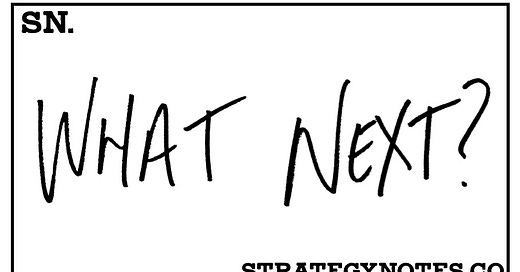Note: This re-post from February 2021 is meant to catch newer readers up to some of the core ideas on Strategy Notes.
I became a strategist over a decade ago and in that time I’ve come to two conclusions. First, I’ve made a lot of mistakes. Second, through the scientific process of sticking my fingers in light sockets, I’ve learned a few things. Some preferences, that, when pulled together, look like a consistent operating system.
This list is not in any order. It’s written from my perspective as a US Army Strategist. Each lesson has wide applicability for many other strategists. Whether you’re struggling, striving, or already successful, many of these will be helpful. Perhaps most. Pluck what’s useful; discard what’s not.
Know yourself first. Write your own mission statement, core competency, maybe even an oath for what you do. Know your contribution. You should be able to articulate this to anyone at any time.
Wear earplugs in the office to focus. They’re cheaper and better than noise-cancelling headphones. Get colorful ones that scream “I’m busy.”
You exist to increase insights and decrease errors wherever you work.
Know the communications tech. If it’s stuff like Zoom then that’s easier. If it’s clunky government VTCs, then learn the dial-ups yourself. Get to know the VTC techs. Bring them coffee (or at least smile kindly).
Invest in tools, not toys.
Ditch the smartphone. Buy a good pen and some paper instead.
Embrace humility. The title “Strategist” does not mean “superior.” You will rely enormously on subject matter experts your entire career as you skip around to different and varied strategic problems.
You can never learn how to “win wars.” You can only hope to learn to win the war you’re in.
Write every day, no matter what. Communication skills will make you or break you. All strategists are writers; all writers are not strategists.
Have daily objectives. Winston Churchill had “ACTION THIS DAY” stickers affixed to documents and projects to be completed in 24 hours. Adopt this practice, sticker or not.
Get to know people. (Admittedly, this isn’t always my strong suit.)
Be loyal, but never a lackey.
Don’t be a “bag handler” (AKA “aide” or “exec”). Sure, somebody’s got to do it, but that isn’t you. Even in the best circumstances, being an aide/exec is a tactical job (which precludes strategic thought).
Read what interests you, not what you think others expect of you. You can learn something from everything.
Give Clausewitz a real chance, not the Cliff’s Notes version offered in professional (military) education settings with necessarily tight timelines.
Be so entirely focused on self-improvement that it leaves you no time to criticize others personally. (Ideas are different. Ideas are fair game.)
“Rowing well” will never be good enough.
Constantly seek new opportunities to learn about strategy.
Choose inputs wisely. We’re all the sum total of our chosen inputs.
Be a storyteller. As Daniel Kahneman once wrote, “No one ever made a decision because of a number. They need a story.” So will you. Strategy-making is storytelling.
Cultivate a life outside work. It’ll make you a better strategist, and a better person.
Believe strategy can be used well and for good.
No, the military’s purpose is not to kill people and break things (even if killing and breaking, as tactical tasks, may be core competencies).
Fiction and film can teach strategy (alongside history and theory).
Maintain physical fitness. There can be no fully sound mind without a fully sound body.
Take caffeine seriously; wield it wisely. (Ditto alcohol.)
Respect elders and superiors by continually coming up with ideas that challenge status quo and tradition.
Believe in miracles. As David Ben Gurion once pointed out, “Anyone who doesn’t believe in miracles is not a realist.”
Never demonize adversaries. As personally disgusting as you may find their behavior, your role demands you attempt to understand your adversary’s mind and even anticipate their next move. You can’t think straight when you’re full of hate.
Work smart. Know the natural rhythms of the day and ride those waves for productive flow.
Take siestas. (And be so good that nobody bothers you if you do.)
Learn to love the differences in the other military services and government/adjacent departments. They may seem strange, but they’ll always make you better and stronger when woven together well.
Be polite. Be respectful. Talk profession and policy, never personal politics.
Never care if your name goes on a document you’ve written. Everyone that matters will know anyways.
Know in your bones that you serve every single American. (Or citizen, or member of your organization or tribe.)
Care about your work. Never seek perfection, but always find your momentary best.
Bring food to work. It’ll save you $100,000 over the course of your career.
Education matters, but doesn’t make you better. Only more educated.
Seek practice in strategy through the opportunities that arise in daily life. Devise personal strategies with roughly the same rigor you would plan for war.
Know your flaws and biases. You have many.
Listen to one podcast every day.
Speak up for your profession as if no one else will. Because they won’t.
Experience the environments you may be forced to fight in someday.
See combat. Expose yourself to war’s consequences. Know them well.
Maintenance matters: vehicle, technological, psychological, physical, personal…
The pen is mightier than the gun. Really.
Love it or hate it, make your peace with PowerPoint. (And for the record, I hate it.)
Never a cynic, always a skeptic. Conduct premortems. Be the “tenth man” (or woman).
Have an undated resignation letter ready to sign. Only then will you have the backbone to take the risks required for success as a strategist.




